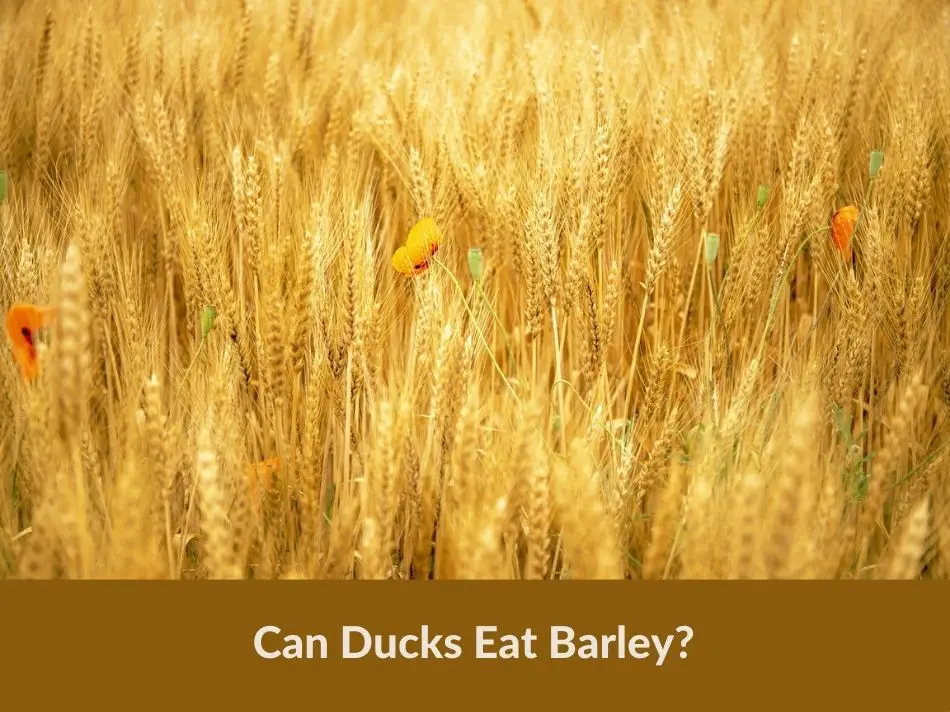In their natural habitat, ducks have a varied diet consisting of small fish, insects, algae, and various types of seeds and grains. Domestic ducks also enjoy a balanced diet that can include poultry pellets, vegetables, and some grains. But, can ducks eat barley?
Yes, ducks can eat barley. Barley is a nutritious grain that offers a good amount of protein, fiber, and essential nutrients. It’s a wholesome supplement to their diet that can be easily digested when properly prepared.
In this article, you’ll find comprehensive insights into ducks eating barley, how often they should be fed this grain, and its health benefits.
How Often Can I Feed My Ducks Barley?
While barley can be a nutritious addition to a duck’s diet, it should not replace a balanced diet consisting of specialized duck pellets and other natural foods. Consider offering barley as a treat or a supplement, perhaps 1-2 times a week.
Can Ducklings Eat Barley?
Ducklings have different nutritional needs than adult ducks and generally require more protein for growth. If you’re considering feeding barley to ducklings, it should be given in moderation and must be cooked and softened to ensure it is easily digestible. Still, for ducklings, it is recommended to stick to starter feeds specially designed for them to meet their nutritional requirements fully.
Barley Nutritional Value
Below is the nutritional value of 100 grams of barley.
- Calories: 123
- Protein: 2.3 g
- Carbohydrates: 28.2 g
- Fiber: 3.8 g
It also contains several vitamins and minerals as listed below.
- Thiamine
- Riboflavin
- Niacin
- Vitamin B6
- Folate
- Iron
- Magnesium
- Phosphorus
- Potassium
- Zinc
- Copper
- Manganese
- Selenium
Are Barley Healthy for Ducks?
Indeed, barley is healthy for ducks when fed in moderation. It’s a good source of dietary fiber, which aids in digestion. The grain is also rich in vitamins like thiamine, riboflavin, and niacin, which play essential roles in metabolic processes.
- Thiamine: Essential for metabolism and energy in ducks. Deficiency can lead to neurological issues.
- Riboflavin: Important for energy production, feather development, and reproductive health in ducks.
- Niacin: Needed for energy production and nervous system function. A lack can result in poor growth.
- Vitamin B6: Helps in amino acid metabolism and supports a healthy nervous system in ducks.
- Folate: Important for cell division and DNA formation, especially during rapid growth or egg development.
- Iron: Required for oxygen transport via hemoglobin. Deficiency can lead to signs of anemia.
- Magnesium: Vital for biochemical reactions, nerve function, and muscle contraction in ducks.
- Phosphorus: Important for bone and teeth formation, as well as energy metabolism.
- Potassium: Helps with muscle function, nerve signaling, and fluid balance in ducks.
- Zinc: Needed for enzymatic reactions, immune function, and skin health.
- Copper: Plays a role in iron metabolism and is involved in feather pigmentation. Excess can be toxic.
- Manganese: Important for bone development, blood clotting, and metabolic processes in ducks.
- Selenium: Acts as an antioxidant and is crucial for preventing diseases and boosting immunity.
How To Feed Barley To Ducks
- Prepare the Barley: Soak or cook the barley to soften it, making it easier for the ducks to digest.
- Portion Control: Limit the amount of barley to ensure it’s given as a treat or supplement, not a main meal.
- Test the Waters: Initially, offer a small amount to see how the ducks react before making it a regular part of their diet.
- Feeding Method: Scatter the prepared barley on the water’s surface or place it in a shallow dish near the ducks.
- Provide Fresh Water: Always make fresh water available for the ducks to aid in digestion and prevent choking.
More Grains & Seeds Ducks Can Eat
Ducks can eat a variety of grains and seeds, which can make for a healthy treat or supplement to their regular diet.
For a comprehensive list of duck-appropriate grains and seeds, explore this link.
Conclusion
Barley can be a nutritious addition to a duck’s diet when fed in moderation. It’s an excellent source of essential nutrients and provides a variety of health benefits. Whether you’re a caretaker or a park visitor, remember that ducks need a balanced diet and fresh water for optimal health.
Feeding ducks should be a responsible and joyful experience for both you and the ducks, so let’s make sure we’re giving them food that is both tasty and nutritious!
Disclaimer: The information in this article is for informational purposes only. I'm not an expert or a veterinarian.


